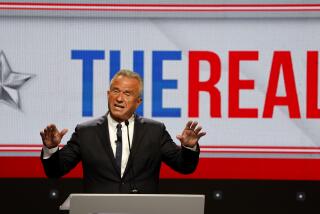Ouch -- Kerry’s Obama endorsement a major diss
- Share via
John Kerry went to John Edwards’ home state the other day to endorse someone else in the Democratic presidential race: Barack Obama.
A major-league diss? Yes. A surprise? Hardly.
Our colleague James Rainey recently spent time with Kerry to produce a rich piece updating the activities -- and aspirations -- of the 2004 Democratic presidential nominee. And following Kerry’s implicit rejection of Edwards, he offered these thoughts:
Kerry’s relationship with Edwards has been strained since early in the last presidential race, when the younger and more naturally gifted pol threatened, first, to overtake Kerry during the primaries and, then, to overshadow him in the general election.
Edwards never embraced the traditional role of the VP candidate as attack dog on the opposite ticket, Kerry’s team believed. They also felt Edwards never deferred to the top of the ticket. “I had to constantly call their road show and remind them that Edwards was running for vice president, not president,” said one top Kerry aide.
Almost immediately after the election loss, Edwards began campaigning for 2008, breaking a pledge Kerry believed he’d secured that Edwards wouldn’t run until Kerry had decided on another try. A close friend said Kerry seethed about what he believed was a betrayal. For his part, the Massachusetts senator declined last month to discuss his relationship with Edwards: “I don’t know where all this stuff comes from. All that stuff is in the past. I want to move on.”
And so he has, tying at least a portion of his political fortunes to Obama.
The Bloomberg watch
The off-again-maybe-on-again-maybe-I’m-not-saying-today potential presidential candidacy of New York Mayor Mike Bloomberg took on some credibility the other day.
Associates of the mayor told the Associated Press that Bloomberg, a billionaire several times over, has begun expensive cross-country detailed polling and sophisticated voter analysis in all 50 states as part of his careful, not-so-secret consideration of a White House bid, presumably as an independent.
“They want a hard-headed sense of their chances,” said Doug Schoen, who ran Bloomberg’s voter database efforts for his two mayoral campaigns.
As if two New Yorkers running to run the country weren’t enough.
Ron Paul, loser again
For months now, Ron Paul supporters have been saying the media, the polls and the prognosticators were all wrong. There was a conspiracy.
Those Paul supporters were actually correct. The media, the polls and the prognosticators were all wrong -- about Barack Obama handily beating Hillary Clinton in New Hampshire. The media that the Paul camp loves to hate was actually right about Ron Paul. He was a long shot. He misfired again. And he got pretty much the same share of New Hampshire GOP votes as the polls indicated.
As he did in Iowa, Paul, despite raising the most money of any GOP presidential candidate in the fourth quarter -- nearly $20 million -- (and $650,000 more so far this month) and despite the vociferous support of many young supporters, once again finished in the back of the GOP pack. He was in single digits this time, versus his 10% in the Iowa contest when he thumped Rudy Giuliani, who got a meager 4%. Then Paul captured zero delegates in the Wyoming caucuses.
The Texas congressman vied with Giuliani for fourth or fifth place with 8% or 9% of the record New Hampshire primary vote. His diverse supporters hoped -- indeed, expected -- that their political passion and heartfelt donations combined with Paul’s candor, constitutional clarity and congressional consistency would reach critical mass in New Hampshire and ignite the Ron Paul Revolution.
It didn’t. Paul lost. Again.
Terrain shifts on Giuliani
The changing mix of issues in the presidential campaign -- and the difficulty that poses for Rudy Giuliani -- was on vivid display during Thursday night’s GOP debate.
A significant shift has occurred in the topics that dominate the political discussion in both parties. As The Times’ Peter Wallsten wrote almost a month ago, the spotlight has moved “from the battlefields of the Middle East and toward kitchen-table issues, such as the economy.”
The first question Thursday on foreign affairs came about 40 minutes into the 90-minute forum. The more that subject is not front and center, the more there is a sense of drift to Giuliani’s efforts.
--
Excerpted from The Times’ political blog, Top of the Ticket, at www.latimes.com/topoftheticket.
More to Read
Get the L.A. Times Politics newsletter
Deeply reported insights into legislation, politics and policy from Sacramento, Washington and beyond. In your inbox twice per week.
You may occasionally receive promotional content from the Los Angeles Times.










